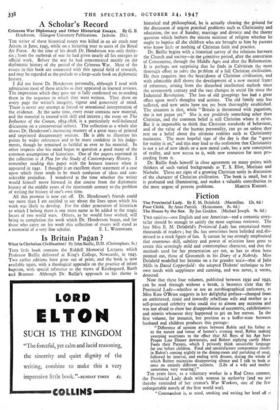Is Britain Pagan ?
What is Christian Civilisation? By John Baillie, D.D. (Christophers. 5s.) Tins little book contains the Riddell Memorial Lectures which Professor Baillie delivered at King's College, Newcastle, in 1945. Two earlier editions have gone out of print, and the book is now available again, with a theological appendix.on the practice of infant baptism, with special reference to the views of Kierkegaard, Barth and Brunner. Although Dr. Baillje's approach to his theme is historical and philosophical, he is actually clearing the ground for the discussion of urgent practical problems such as Christianity and
education, the use of Sunday, marriage and divorce and the thorny question which bothers the sincere minister of religion whether he ought to baptise all the children who are brought to him by parents who know littl! or nothing of Christian faith and practice.
Dr. Baillie begins with a historical survey of the relations between the Church and society—in the primitive period, after the conversion
of Constantine, through the Middle Ages and after. the Reformation.
It is perhaps not surprising that he finds in Calvinism the most thorough effort to solve the problem of a full Christian civilisation.
He then enquires into the breal:clown of Christian civilisation, and with admirable skill shows the development of a new mental frame of reference, arising from the disturbed intellectual outlook since the seventeenth century and the vast changes in social life since the Industrial Revolution. The loss of old groupings has had a great effect upon men's thoughts and actions. The old family unit has suffered, and new units have not yet been thoroughly established. The situation is that, while " Britain is threatened with paganism, she is not pagan yet." She is not positively something other than Christian, and the common belief is still Christian where it exists. But it is impossible to think that Christian standards of behaviour, and of the value of the human personality, can go on unless they rest on a belief about the ultimate realities such as Christianity maintains. The most hopeful sign of the day is that the "quest for reality is on," and this may lead to the realisation that Christianity is not a set of new ideals or a new moral code, but a new conception of reality, and new access to it, with new resources for men pro- ceeding from it.
Dr. Baillie finds himself in close agreement on many points with thinkers of such varied backgrounds as T. S. Eliot, Maritain and Niebuhr. These are signs of a growing Christian unity in discussion of the character of Christian civilisation. The book is small, but it is profound and illuminating, and makes a valuable contribution to
the most urgent of present problems. MARCUS KNIGHT.
































 Previous page
Previous page